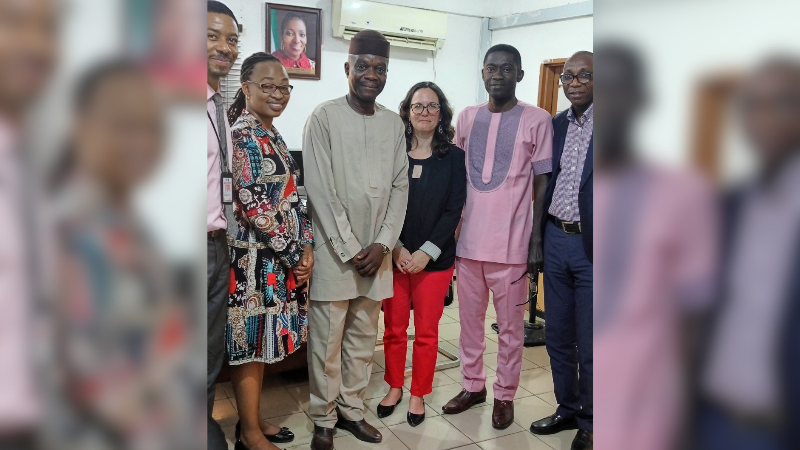How Our Embedded Lab Can Combat Human Trafficking in Nigeria
Nigeria, Africa’s most populous country and largest economy, remains a major human trafficking source, transit, and destination country. According to UNODC, an estimated 750,000-1,000,000 Nigerians are trafficked every year. Given the dire situation, the Government of Nigeria created the National Agency for the Prohibition of Trafficking in Persons (NAPTIP) in 2003 to develop and coordinate a national strategy combating trafficking in persons. According to a 2020 NAPTIP report, sex trafficking is particularly rampant in Nigeria, with nearly half of all rescued victims reporting they were procured for sexual exploitation, prostitution, or pornography.
On May 5, 2023, Innovations of Poverty Action (IPA) and NAPTIP signed a two-year Memorandum of Understanding (MOU). Under this agreement, IPA will support NAPTIP in carrying out its ambitious mandates of increasing the rate of prosecutions and convictions of traffickers, providing comprehensive support to survivors, and increasing general awareness about trafficking.
The new partnership will allow NAPTIP to develop and implement rigorous research and to translate new evidence into improved programs and policies–using data to determine the rationale, direction, and pace of actions against sex trafficking.

Through this partnership, IPA will support the Nigerian government to reduce human trafficking by establishing a Human Trafficking Embedded Evidence Lab–a permanent infrastructure that will equip NAPTIP to develop and deliver more effective, evidence-based policies and programs to combat sex trafficking. This lab aims to support the institutionalization of a culture of evidence-based decision-making by mapping administrative data, working side-by-side with NAPTIP teams and partners on capacity building, and evaluating innovations in human trafficking policies.
The implementation stakeholders of the lab are composed of three groups:
- Advisory Committee whose role is to provide governance and strategic advice;
- Lab leadership made up of NAPTIP’s Director of Research and Programme Development and IPA staff whose role is to provide oversight and management; and a
- Lab team comprising NAPTIP and IPA staff who will provide day-to-day implementation of the lab’s activities.
The Human Trafficking Embedded Evidence Lab will pursue the following objectives:
- Address NAPTIP’s demand for timely evidence generation.
- Strengthen the capacity of NAPTIP to generate, understand, and apply high-quality evidence.
- Co-create pilot interventions that are survivor-centered.
- Create a culture of survivor-centered and trauma-informed approaches to NAPTIP’s evidence-gathering and program design processes.
- Facilitate the exchange and transfer of the lab’s evidence and learnings to major actors in the anti-trafficking space in Nigeria.
- Reduce the prevalence of sex trafficking in Nigeria through NAPTIP and its partners’ enhanced ability to develop programs in response to accurate prevalence trends and scientifically measure the impact of innovative, evidence-based programs.
The embedded evidence lab will conduct a human trafficking prevalence study, to answer the following research questions: (1) what is the prevalence of different forms of human trafficking in Edo, Delta, and Yobe, three high-vulnerability states in Nigeria?; (2) which individuals, households, and communities are most vulnerable to sex trafficking, and how can this information be used to more effectively target counter-trafficking initiatives?
Subsequently, IPA will conduct a follow-up prevalence study to measure: (1) whether there has been a meaningful reduction in sex trafficking in these states; and 2) if there are any observable shifts in the forms of human trafficking taking place in these states and the profiles of those found to be most vulnerable during the baseline.
In the coming weeks, IPA will constitute and inaugurate a Human Trafficking Embedded Lab Advisory Committee composed of representatives of anti-trafficking organizations (including Pathfinder Justice Initiative and Network of Civil Society Organizations against Child Trafficking, Abuse, and Labor), human trafficking researchers, survivors with lived experiences of human trafficking, IPA Nigeria, and NAPTIP. The advisory committee will provide governance and strategy including making recommendations to guide the embedded lab from a sectoral, research, and policy lens; periodically assess whether the lab is reaching its objectives; and provide strategic direction for lab staff.
In the coming months, workshops and trainings will be provided by IPA to relevant NAPTIP staff and anti-trafficking organizations, to help strengthen these institutions and build their capacities. These workshops will cover topics such as the theory of change, monitoring and evaluation indicators, robust evaluation methodologies, cost-effectiveness analysis, and integrating robust evidence in decision-making. Other tailored workshops and trainings for NAPTIP staff include safeguarding mechanisms and support to better reach men and boys’ populations with trauma- and survivor-informed services.
Human trafficking is an abhorrent crime that is exacting a high toll in Nigeria. Leveraging data and evidence through research can disrupt the vicious cycle of human trafficking and empower governments with critical information and support to address the roots of the problem.
For more information on the IPA Nigeria - Human Trafficking Embedded Evidence Lab partnership, please contact:
Micah Mendie | Policy and Embedded Lab Manager, IPA Nigeria | mmendie@poverty-action.org | +234 803 942 473
“This project is implemented with support from the United States Department of State - Program to End Modern Day Slavery (PEMS). The views expressed are those of the author and do not necessarily reflect the views of USDOS-PEMS or the United States Government.”
(Cover Photo by Desola Lanre-Ologun on Unsplash)











